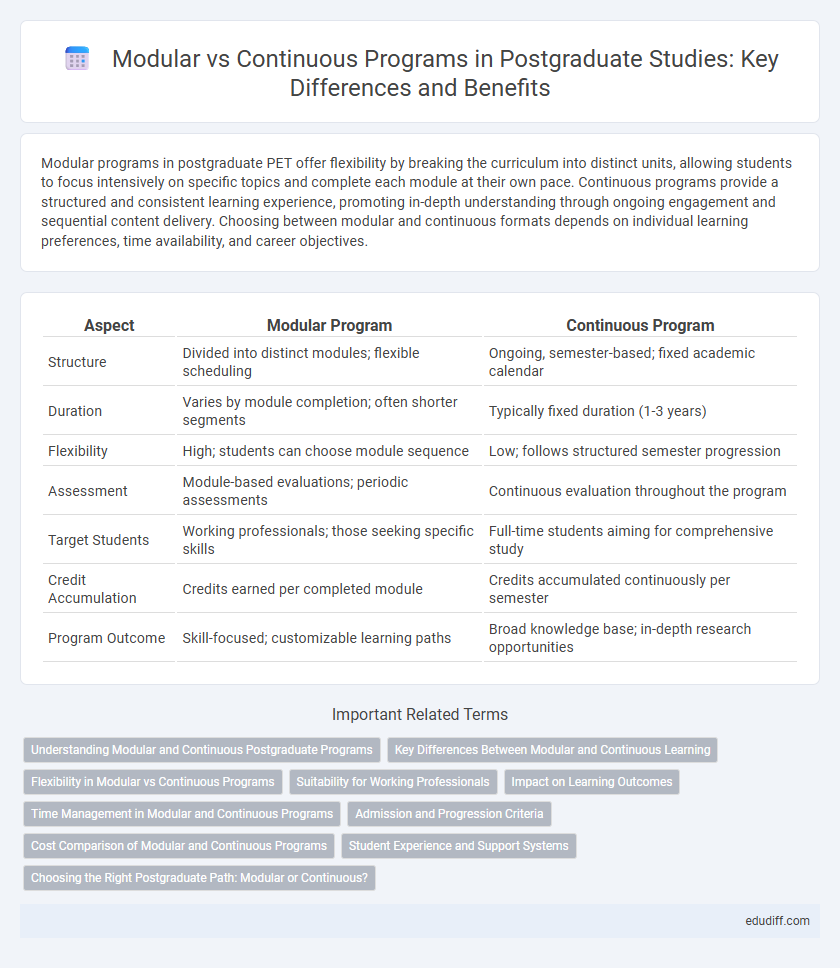Modular programs in postgraduate PET offer flexibility by breaking the curriculum into distinct units, allowing students to focus intensively on specific topics and complete each module at their own pace. Continuous programs provide a structured and consistent learning experience, promoting in-depth understanding through ongoing engagement and sequential content delivery. Choosing between modular and continuous formats depends on individual learning preferences, time availability, and career objectives.
Table of Comparison
| Aspect | Modular Program | Continuous Program |
|---|---|---|
| Structure | Divided into distinct modules; flexible scheduling | Ongoing, semester-based; fixed academic calendar |
| Duration | Varies by module completion; often shorter segments | Typically fixed duration (1-3 years) |
| Flexibility | High; students can choose module sequence | Low; follows structured semester progression |
| Assessment | Module-based evaluations; periodic assessments | Continuous evaluation throughout the program |
| Target Students | Working professionals; those seeking specific skills | Full-time students aiming for comprehensive study |
| Credit Accumulation | Credits earned per completed module | Credits accumulated continuously per semester |
| Program Outcome | Skill-focused; customizable learning paths | Broad knowledge base; in-depth research opportunities |
Understanding Modular and Continuous Postgraduate Programs
Modular postgraduate programs divide the curriculum into distinct units, allowing students to complete specific modules independently, offering greater flexibility and targeted skill acquisition. Continuous postgraduate programs require students to engage in a consistent, uninterrupted study schedule, promoting sustained learning and in-depth subject mastery. Choosing between modular and continuous formats depends on a student's professional commitments, preferred learning pace, and educational goals.
Key Differences Between Modular and Continuous Learning
Modular programs structure postgraduate courses into discrete, self-contained units that allow focused study and flexible pacing, whereas continuous programs involve ongoing, uninterrupted coursework fostering in-depth subject immersion. Modular learning maximizes adaptability for working professionals by enabling selective module completion, while continuous learning emphasizes consistent engagement and holistic curriculum progression. Assessment methods in modular programs often focus on module-specific evaluations, contrasting with continuous programs that typically utilize cumulative assessments reflecting the entire course content.
Flexibility in Modular vs Continuous Programs
Modular programs offer enhanced flexibility by allowing postgraduate students to select and complete individual modules at their own pace, accommodating varying schedules and commitments. Continuous programs require adherence to a fixed timeline and sequence of courses, limiting the ability to adjust study duration or order of subjects. This flexibility in modular programs supports personalized learning paths and better balances professional and academic responsibilities.
Suitability for Working Professionals
Modular postgraduate programs offer flexible scheduling and intensive coursework segments, making them ideal for working professionals managing time constraints and career commitments. Continuous programs provide a structured, steady pace that benefits individuals seeking consistent academic engagement but may require more regular time investment incompatible with full-time employment. Choosing between these formats depends on balancing professional responsibilities with learning preferences to optimize academic and career outcomes.
Impact on Learning Outcomes
Modular programs enhance learning outcomes by allowing postgraduate students to focus intensively on specific subjects in shorter, manageable segments, promoting deeper understanding and retention. Continuous programs provide a structured, ongoing curriculum that supports consistent knowledge acquisition and skill development over time, fostering comprehensive expertise. Research indicates that modular delivery improves flexibility and student engagement, while continuous programs better support long-term cognitive integration and professional competency.
Time Management in Modular and Continuous Programs
Modular programs offer flexible time management by allowing postgraduate students to progress through independent modules at their own pace, often accommodating part-time study and work commitments. Continuous programs require consistent weekly attendance and steady workload management, demanding a more rigid schedule ideal for full-time postgraduate students. Effective time management in modular programs relies on self-discipline and planning, whereas continuous programs emphasize structured routine and ongoing engagement.
Admission and Progression Criteria
Modular programs admit students based on completed credit modules or specific foundational courses, allowing flexible entry points and progression through discrete units, while continuous programs require a comprehensive academic background for direct admission and follow a linear progression path. Modular program progression depends on passing individual modules with minimum grade thresholds, enabling intermittent assessments and course adjustments, whereas continuous programs mandate sustained academic performance across semesters with cumulative GPA requirements for advancement. Admission criteria for modular programs emphasize prior relevant coursework and competency in key subjects, contrasting with continuous program prerequisites that focus on standardized test scores and overall academic records.
Cost Comparison of Modular and Continuous Programs
Modular programs often incur higher per-module fees but allow students to pay incrementally, offering flexibility in financial planning compared to continuous programs with a lump-sum tuition fee. Continuous programs typically provide cost efficiency through a comprehensive payment structure, potentially reducing overall expenses via bundled services and materials. Analyzing the total cost of ownership, modular programs may lead to increased administrative fees, while continuous programs benefit from economies of scale in resource allocation.
Student Experience and Support Systems
Modular programs offer postgraduate students flexible scheduling and tailored coursework, enhancing personalized learning and accommodating diverse professional commitments. Continuous programs provide consistent, immersive academic engagement and stronger cohort community building, fostering collaboration and sustained institutional support throughout the study period. Both models integrate dedicated support systems, but modular programs often emphasize individualized academic advising and remote resources, whereas continuous programs prioritize on-campus services and real-time peer interaction.
Choosing the Right Postgraduate Path: Modular or Continuous?
Choosing the right postgraduate path depends on your personal schedule, learning style, and career goals, with modular programs offering flexible, intensive study periods ideal for working professionals, while continuous programs provide a steady, immersive experience for those seeking comprehensive academic engagement. Modular programs typically allow for specialization in shorter timeframes, enabling quicker application of skills in professional settings. Continuous programs often emphasize consistent learning and deeper research opportunities, beneficial for students aiming for academic or research-oriented careers.
Modular Program vs Continuous Program Infographic

 edudiff.com
edudiff.com